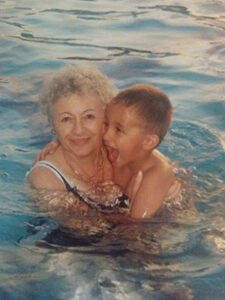Singing Israel’s History Back to Life

Several months into his reserve duty in both northern and southern Israel after October 7th, Gal Menashe ’25 stood at the hospital bed of a childhood friend who was critically injured in Gaza. When he stepped into the hall, another friend turned to him and laid down the gauntlet. “He knew that growing up, I had always dreamed of singing professionally,” says Gal, who performed and studied music in one of Israel’s leading conservatories until his decision to become a combat soldier. “He said, ‘you see that everything can change in an instant. There might not be a ‘later,’ so how can you wait for then?’”
Unable to shake his friend’s words, Gal brought his guitar back to his base the following week, “just to get the feel of music again,” he says. Nearly two years later, the chords he strummed became the basis of his inaugural album, Lullabies: a remake of the songs he’d heard from his earliest days, sung by his grandmother on their kibbutz.
“It makes sense that the songs I would turn to in a time of difficulty would be the ones that brought me the most comfort when I was young,” says Gal, who grew up in Mitzpeh Hila—a small village near Israel’s border with Lebanon—and went to school at nearby Kibbutz Kabri, where his grandparents lived. “These were the songs that my grandmother sang to help me fall asleep when I was an infant. Even before I learned to speak, I could hum the melody to these songs. They’re a part of my history.”

Gal and his grandmother, Shula Lindemann
And, in turns out, part of the history of the State of Israel. Specifically, the history of those Jews—like Gal’s grandmother Shula—who arrived from war-torn Europe and helped found the Jewish homeland.
“My grandmother was part of that generation of Jews who were encouraged to make a clean break with the world they left behind,” says Gal, whose German-born grandmother was saved from the Nazis by a pair of sisters who hid her and other Jewish children in the Alps for five years. When she arrived in Israel, she lived in Jerusalem until her twenties, when she went north to volunteer on Kibbutz Kabri. There, she met and married another German Holocaust survivor, Gal’s grandfather Daniel Lindemann; together, they had five children, one of whom is Gal’s mother.
“When my mother grew up on the kibbutz, children were still raised in a Beit Yeled (“children’s house”),” Gal continues. “She had very little contact with her parents, save for a few hours at night before bed. That’s when her mother—my grandmother—sang her those songs, which were then well-known in the kibbutz movement.” By the time his grandmother sang those songs to him, however, Israel’s kibbutzim had undergone a significant shift, with the new generation preferring individual entrepreneurship and life in Israel’s cities. “The more I looked into these songs’ roots, the more I realized that they capture a very particular, idealistic yet challenging moment in our nation, one that’s quickly fading from memory.” Gal asked Etai Berkovich, the friend who sparked his return to music—who is himself a talented guitar player and successful music producer—if they could try to revive that moment by making covers of his grandmother’s songs.
“I’m fortunate that he was enthusiastic about the idea, and more so, that he was willing to undertake the enormous challenge of making it happen,” says Gal, who insisted that each song be a single take, just as it would be sung by an adult to a child. The outcome—an authentic, intimate experience for the listener—was celebrated both by fellow musicians and average Israelis for whom Gal’s music brought back memories. “People from all over Israel have written to say that they heard this or that song from their own mothers and grandmothers, and that they’re so happy the music no longer exists only in their own heads. That I’ve preserved it and brought it into the world.”
Of course, Gal’s unorthodox approach meant “easily a thousand takes per song.” He describes the arduous process as a journey—into his and his family’s past, as well as into a future where making music looks very different than it once did.

Gal at the wedding of his friend, a year after the latter recovered from critical injuries sustained in Gaza.
“I feel lucky to live in a time when technology makes it possible to engage a passion for music while also pursuing other goals. I believe in the Shalem model of learning and doing many things, not just one,” says Gal, who currently works as a political advisor for MK Alon Schuster of the Blue and White party. He is also planning to produce a second album with the lullabies that didn’t make it onto the first, and is even singing informally—such as at the recent wedding of his wounded unit member, who made an astounding recovery.
“It is deeply fulfilling to be able to use my voice to provide comfort and joy, but also a sense of rootedness and purpose,” says Gal. “That’s exactly what my grandmother intended when she sang for me.”



